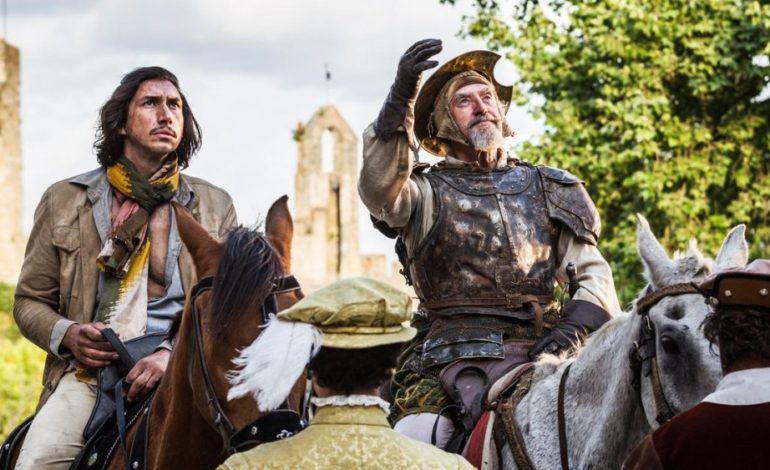

British-American director and former Monty Python member, Terry Gilliam is a warrior. A quarter of a century ago, he embarked to make a movie that suffered some of the worst catastrophes one can imagine for a film: a flash flood destroyed the sets and washed away the equipment; insurance did not cover the cost of the damage; the lead departed due to health issues; support and money were revoked, etc. But none of this was effective at preventing Gilliam to attempt to finish the film for many years afterward, re-rescheduling, re-casting and re-writing, until the principle photography for The Man Who Killed Don Quixote was finally completed last June, with Jonathan Pryce and Adam Driver in the lead roles.
After first being conceptualized in 1989, Don Quixote follows an up-and-coming film director who, after returning to Europe to shoot a follow-up to his student film about Quixote, discovers that his lead actor never left the shoes of the main protagonist, staying in character during the years of the director’s absence, believing himself to be the real windmill slayer.
Set to be screened during the closing night of this year’s Cannes Film Festival, even at its release, Don Quixote suffered tremendous pressure. The film’s producer, Paulo Branco, sued the production claiming to possess all the rights for the film, putting its premiere in question as legal matters had to be orchestrated. While the lawsuit was judged in Gilliam’s favor, — a decision that was reached with the outmost support of the festival — the lawsuit still caused significant damage. Amazon Studios, who were set to release the film, dropped the project prior to the court case being resolved, determined to stay out of the scandal. Gilliam, in a recent interview, addressed Amazon’s leave, saying, “Their excuse is like the line that Stellan [Skarsgard] says [in Don Quixote]: “Tell them I can’t help, I’ve got a company to run, people depend on me.” It was like that: “We’ve got bigger problems.” But they don’t have bigger problems, they just don’t want to be bothered.” The film is now still set for the closing night of the festival.
With the mounting pressure of the possibility of the film not being premiered or distributed, Gilliam suffered a minor stroke last week which put him out of commission for a few days but was not too sever to prevent him from attending the opening screening of his film this Sunday. The disastrous curse that followed Don Quixote for so many years shows that, even in the case of the worst struggle, a determined filmmaker, possessing pure love and compassion for his or her art, cannot be stopped. The cases of Francis Ford Coppola’s suicidal state during the infamous production of Apocalypse Now, and Werner Herzog’s animalistic determination to get a ship over a mountain against sever odds (including death threats from his lead, Klaus Kinski) when filming the historic epic Fitzcarraldo, come to mind as a few other examples in which the mental strength of a director pushed the project through a mud of misfortune. What both Coppola and Herzog achieved in return are films that, besides being excellent and gaining universal acclaim, possess cultural and historic significance that transcend any issue met by the production. This Sunday, Terry Gilliam himself will finally be able to prove to the world that everything he has been through with a story that he has tried to tell for almost three decades, was worth it.
Check out the trailer for The Man Who Killed Don Quixote! Coming soon (finally!!)
